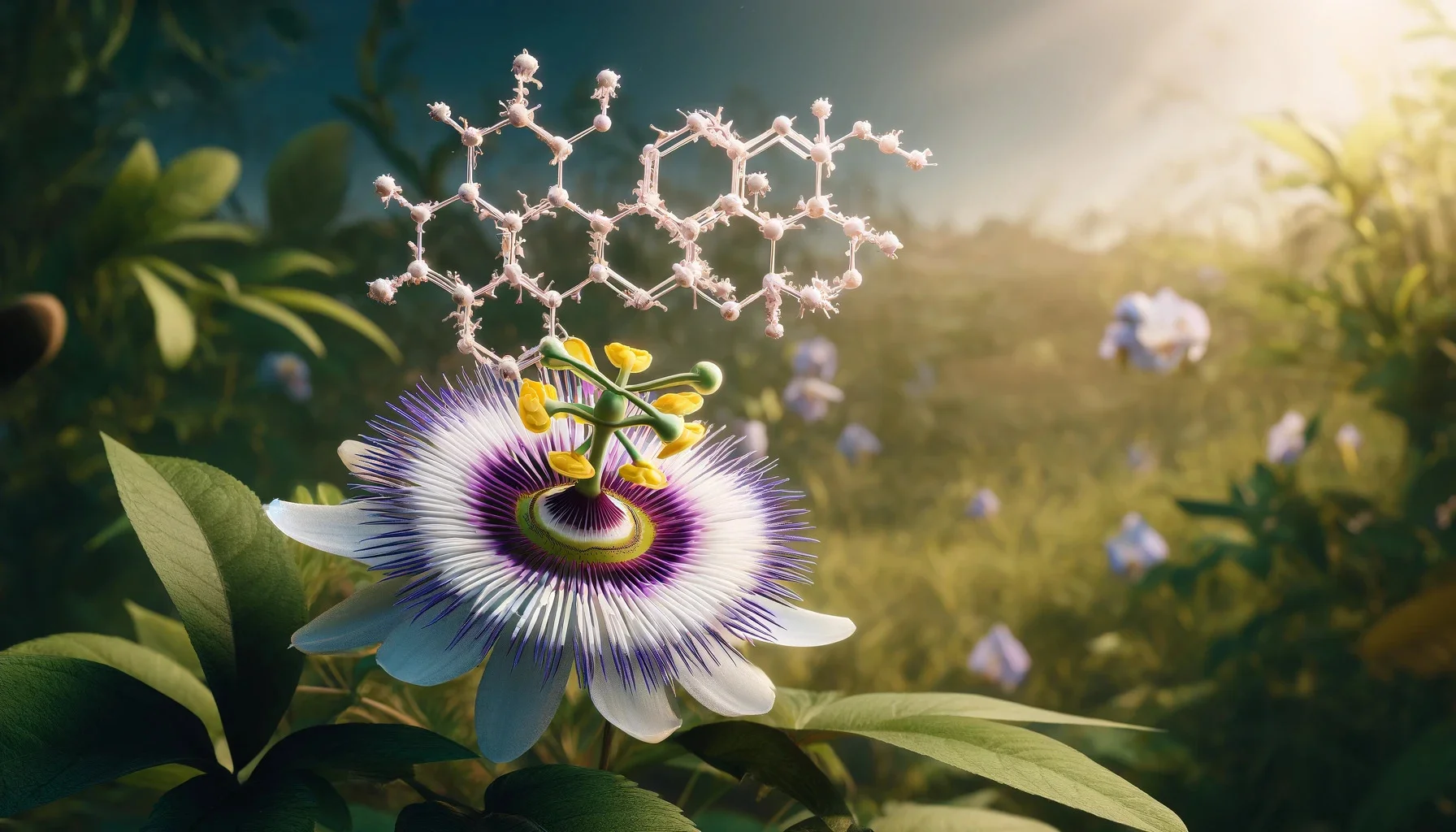
Passionflower (Passiflora incarnata) is a climbing vine native to the southeastern United States and Central and South America.
It’s known for its beautiful, intricate flowers and its use as a natural remedy for anxiety, insomnia, and other health issues.
Passionflower contains several bioactive compounds, including flavonoids, indole alkaloids, and maltol, which contribute to its sedative, anxiolytic, and nootropic effects.
This article will explore Passionflower, its bioavailability, mechanisms of action, cognitive benefits, neuroprotective properties, recommended dosage, and potential precautions.
Table of Contents
What is a Passionflower?
Passionflower (also known as Pasiflora, passion vine, wild apricot or Maypops) is a perennial climbing vine that belongs to the Passifloraceae family.

It’s characterized by its showy, complex flowers that feature a corona of filaments in a ring around the center. It’s also named for its intricate purple and white flowers that bloom from May to July.
Passionflower has been used for centuries in traditional medicine to treat various ailments, including anxiety, insomnia, and epilepsy.
What are the Different Types of Passionflower?
There are over 500 species of passionflowers, such as:
- Passiflora incarnate: Purple Passionflower, the most widely studied for medicinal use
- Passiflora edulis: Used to make Passionflower fruit and also has medicinal properties
- Passiflora caerulea: Blue Passionflower, grown ornamentally
- Passiflora alata: Winged-stem Passionflower, used medicinally in Brazil
What are The Bioactive Compounds in Passionflower?
The main bioactive compounds in Passionflower include:
- Flavonoids (vitexin, isovitexin, orientin, isoorientin, apigenin, kaempferol) – up to 2.5%
- Indole alkaloids (harman, harmin, harmaline, harmol) – 0.1%
- Gamma-aminobutyric acid (GABA)
- Cyanogenic glycosides
- Chrysin
- Benzoflavone
- Maltol
- Phytosterols
These work synergistically to provide Passionflower’s therapeutic effects.
How Bio-Available Is Passionflower Extract?
Passionflower extract is well-absorbed orally, with bioavailability estimated at 30-35% according to pharmacokinetic studies. The flavonoids and indole alkaloids can cross the blood-brain barrier to exert effects on the central nervous system.
However, the bioavailability of indole alkaloids, such as harman and harmaline, is higher, with oral bioavailability ranging from 42% to 65%.
Peak plasma levels occur 30-120 minutes after ingestion.
What Is Passionflower’s Mechanism of Action?
Passionflower exerts its effects through several mechanisms:
- GABA modulation: Flavonoids in Passionflower, such as apigenin and chrysin, bind to GABA receptors and increase GABA activity, leading to sedative and anxiolytic effect.
- Monoamine oxidase inhibition: Indole alkaloids like harman and harmine inhibit monoamine oxidase (MAO) enzymes, which break down neurotransmitters such as serotonin, dopamine, and norepinephrine. MAO inhibition can increase the levels of these neurotransmitters, improving mood and cognitive function.
- Antioxidant and anti-inflammatory effects: Passionflower contains antioxidant compounds that scavenge free radicals and reduce oxidative stress in the brain. It also has anti-inflammatory properties that may protect against neuroinflammation.
Does Passionflower Have Sedative Effects?
Yes, Passionflower has sedative effects due to its ability to modulate GABA activity.(1)
A randomized, double-blind, placebo-controlled trial by Ngan and Conduit found that Passionflower extract improved sleep quality in healthy adults.(2)
The study participants who received Passionflower reported a 5% increase in sleep quality compared to the placebo group.
What are the Cognitive Benefits of Passionflower?
The cognitive benefits of Passionflower include:
- Reduced anxiety and stress
- Improved sleep quality
- Enhanced memory and cognition
- Neuroprotection against oxidative damage
- Increased focus and concentration
- Stabilized mood
These effects are attributed to the Passionflower’s GABAergic, serotonergic, and anti-inflammatory activity in the brain.

Can Passionflower Improve Brain Health?
Yes, Passionflower may improve brain health through its neuroprotective, anti-inflammatory, and antioxidant properties.
These effects can help protect against age-related cognitive decline, neurodegenerative diseases, and oxidative stress-induced damage to brain cells.(3)
Additionally, chrysin and benzoflavone improve blood flow and oxygenation in the brain by inhibiting MAO enzymes.
Lastly, by increasing GABA, serotonin, and dopamine, Passionflower optimizes neurotransmission for better cognitive function.
Do Passionflowers Have Neuroprotective Properties?
Passionflower has demonstrated neuroprotective properties in several studies.
For example, a study found that Passionflower’s fruit extract protected against oxidative stress and inflammation in the brains of aged rats.(4)
The extract also improved memory and learning in the aged rats, suggesting potential benefits for age-related cognitive decline.
Does Passionflower Enhance Memory?
Some evidence suggests that Passionflower enhances memory, possibly by reducing anxiety and improving sleep quality.
A study by Jawna-Zboińska et al. (2016) found that healthy adults who took Passionflower extract for 2 weeks had improved memory performance compared to a placebo group.(5)
The researchers speculated that Passionflower’s calming effects might have allowed for better memory consolidation and recall.
Additionally, Passionflower’s antioxidant and anti-inflammatory properties help protect brain cells involved in memory formation and storage from oxidative damage.
However, more research is needed to fully understand Passionflower’s effects on memory and the underlying mechanisms involved.
Can Passionflower Reduce Depression and Anxiety?
Yes, Passionflower has shown promise in reducing symptoms of depression and anxiety in several studies.
For example, a study found that Passionflower extract was as effective as the benzodiazepine oxazepam for treating generalized anxiety disorder, with fewer side effects.
- A study by Movafegh et al. (2008) showed that preoperative administration of Passionflower reduced anxiety in patients undergoing spinal anesthesia.
- Miyasaka et al. (2007) conducted a systematic review of herbal medicines for anxiety and concluded that Passionflower had a significant anxiolytic effect.
Passionflower’s ability to reduce depression and anxiety is likely due to its modulation of GABA and serotonin, as well as its MAO inhibition, which can increase levels of mood-regulating neurotransmitters.(6)
Does Passionflower Improve Attention and Working Ability?
Yes, Passionflower may improve attention and working memory.
A 2019 randomized controlled trial found 500 mg of Passionflower extract daily for 8 weeks improved performance on the Stroop Color-Word Test, a measure of executive function and selective attention, compared to placebo.(7)
The mechanisms likely involve GABA and serotonin modulation in the prefrontal cortex, which governs higher-order cognitive processes.(8)
How To Use Passionflower as A Nootropic?
Passionflower may be used as a nootropic for the following purposes:
- Reducing anxiety and stress
- Improving sleep quality
- Enhancing memory and learning
- Boosting focus and attention
- Supporting overall brain health and neuroprotection
What is the Recommended Dosage for Passionflower?
The recommended dosage for Passionflower depends on the specific product and the intended use.

Generally, the following dosages of Passionflower have been used in clinical studies:
| Form | Dose | Frequency |
|---|---|---|
| Dried herb | 2-5 grams | up to three times daily |
| Fluid extract (1:1) | 2-5 mL | up to three times daily |
| Tincture (1:5) | 10-30 drops | up to three times daily |
Can Passionflower Be Used in A Nootropic Stack?
Yes, Passionflower can be used in a nootropic stack to enhance its cognitive benefits and synergize with other nootropic compounds.
Some potential combinations include:
- Passionflower + L-theanine: For increased relaxation and stress reduction
- Passionflower + Bacopa monnieri: For improved memory and learning
- Passionflower + Ginkgo biloba: For enhanced neuroprotection and cognitive function
What Are Passion Fruit Extracts Made With?
Passion Fruit extracts are typically made with the aerial parts of the Passionflower plant, including the leaves, stems, and flowers.
The extraction process involves drying the plant material and then using a solvent, such as water, alcohol, or glycerin, to extract the bioactive compounds.
The resulting extract is then concentrated and standardized to ensure consistent potency and quality.
Are There Any Side Effects or Considerations With Passionflower?
Passionflower is considered safe when used in recommended doses for short periods. However, some people may experience side effects, such as:
- Drowsiness
- Dizziness
- Confusion
- Nausea
- Vomiting
Who Should Avoid Passionflower?
The following individuals should avoid using Passionflower or consult with a healthcare professional before use:
- Pregnant and breastfeeding women
- People with liver or kidney disease
- Individuals taking sedatives, antidepressants, or blood thinners
- Those scheduled for surgery (Passionflower may interfere with anesthesia)
Are There Any Potential Reactions with Passionflower and Medication?
Yes, Passionflower may interact with certain medications, including:
- Sedatives and anti-anxiety drugs: Passionflower may enhance the effects of these medications, leading to excessive drowsiness and impaired cognitive function.
- Antidepressants: Passionflower’s MAO inhibition properties may interact with antidepressants, potentially causing serotonin syndrome.
- Blood thinners: The flavonoids in Passionflower may increase the risk of bleeding when combined with blood-thinning medications.
- Anticoagulants and antiplatelet drugs: Passionflower may increase the risk of bleeding when used with these medications.
- Monoamine oxidase inhibitors (MAOIs): Passionflower may potentiate the effects of MAOIs, leading to an increased risk of side effects and adverse reactions.
- Lee, Jeewon et al. “Effects of Passiflora incarnata Linnaeus on polysomnographic sleep parameters in subjects with insomnia disorder: a double-blind randomized placebo-controlled study.” International clinical psychopharmacology vol. 35,1 (2020): 29-35. doi:10.1097/YIC.0000000000000291↩
- Ngan, A, and R Conduit. “A double-blind, placebo-controlled investigation of the effects of Passiflora incarnata (passionflower) herbal tea on subjective sleep quality.” Phytotherapy research : PTR vol. 25,8 (2011): 1153-9. doi:10.1002/ptr.3400↩
- Ingale, Suvarna P, and Sanjay B Kasture. “Protective Effect of Standardized Extract of Passiflora incarnata Flower in Parkinson’s and Alzheimer’s Disease.” Ancient science of life vol. 36,4 (2017): 200-206. doi:10.4103/asl.ASL_231_16↩
- Kandandapani, Salanee et al. “Extracts of passion fruit peel and seed of Passiflora edulis (Passifloraceae) attenuate oxidative stress in diabetic rats.” Chinese journal of natural medicines vol. 13,9 (2015): 680-6. doi:10.1016/S1875-5364(15)30066-2↩
- Jawna-Zboińska, Katarzyna et al. “Passiflora incarnata L. Improves Spatial Memory, Reduces Stress, and Affects Neurotransmission in Rats.” Phytotherapy research : PTR vol. 30,5 (2016): 781-9. doi:10.1002/ptr.5578↩
- Janda, Katarzyna et al. “Passiflora incarnata in Neuropsychiatric Disorders-A Systematic Review.” Nutrients vol. 12,12 3894. 19 Dec. 2020, doi:10.3390/nu12123894↩
- Nojoumi, Mandana et al. “Effects of Passion Flower Extract, as an Add-On Treatment to Sertraline, on Reaction Time in Patients with Generalized Anxiety Disorder: A Double-Blind Placebo-Controlled Study.” Iranian journal of psychiatry vol. 11,3 (2016): 191-197.↩
- Prasertsri, Piyapong et al. “Immediate effects of passion fruit juice supplementation on working ability and attention in healthy participants.” Current research in physiology vol. 7 100120. 15 Feb. 2024, doi:10.1016/j.crphys.2024.100120↩
